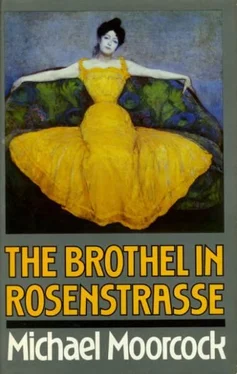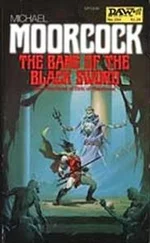Michael Moorcock - The Brothel in Rosenstrasse
Здесь есть возможность читать онлайн «Michael Moorcock - The Brothel in Rosenstrasse» весь текст электронной книги совершенно бесплатно (целиком полную версию без сокращений). В некоторых случаях можно слушать аудио, скачать через торрент в формате fb2 и присутствует краткое содержание. Жанр: Эротические любовные романы, на английском языке. Описание произведения, (предисловие) а так же отзывы посетителей доступны на портале библиотеки ЛибКат.
- Название:The Brothel in Rosenstrasse
- Автор:
- Жанр:
- Год:неизвестен
- ISBN:нет данных
- Рейтинг книги:3 / 5. Голосов: 1
-
Избранное:Добавить в избранное
- Отзывы:
-
Ваша оценка:
- 60
- 1
- 2
- 3
- 4
- 5
The Brothel in Rosenstrasse: краткое содержание, описание и аннотация
Предлагаем к чтению аннотацию, описание, краткое содержание или предисловие (зависит от того, что написал сам автор книги «The Brothel in Rosenstrasse»). Если вы не нашли необходимую информацию о книге — напишите в комментариях, мы постараемся отыскать её.
The Brothel in Rosenstrasse — читать онлайн бесплатно полную книгу (весь текст) целиком
Ниже представлен текст книги, разбитый по страницам. Система сохранения места последней прочитанной страницы, позволяет с удобством читать онлайн бесплатно книгу «The Brothel in Rosenstrasse», без необходимости каждый раз заново искать на чём Вы остановились. Поставьте закладку, и сможете в любой момент перейти на страницу, на которой закончили чтение.
Интервал:
Закладка:
These mansions on the very fringe of the Old Quarter were once the residences of the ruling class but are today primarily public buildings and museums. They retain their grounds and their imported trees and shrubs. The largest house which the student, now clinging to the railings, would be able to see if he lifted his hat, was the summer place of the Graf Gunther von Baudessin who said he loved the city more than his own Bavarian estates. He was for a while special ambassador for his homeland and did much to help Mirenburg retain her independence during the expansionist wars of the mid-eighteenth century when three enemies (Russia, Saxony and Austria) converged on Waldenstein’s borders, then failed to agree who should own the province.
From the Gardens come a thousand scents: autumn flowers and shrubs; the small, scarlet deeply-perfumed rose for which Mirenburg is famous blooms late and sometimes lasts until December. There is still dew on the grass. The student steadies himself and continues, turning back up the broad avenue of Pushkinstrasse. He is alerted momentarily by the cry of some exotic beast awakening in the nearby Zoo. A milkman’s cart, decorated in blue, red and green, passes him, its cans jingling, its boney horse rolling her old eyes in the shade of her blinkers as she takes her familiar course. He reaches the Lugnerhoff at last, where the Protestant martyrs were burned in 1497. Here the houses are suddenly close-packed, leaning one upon the other like a crowd of old men around a game of bowls. In the centre of the cobbled court is a baroque fountain: the defiant Hussites about to mount their pyre. The student crosses
Lugnerhoff to reach the narrow entrance to Korkziehiergasse and sunlight touches a green copper roof. Only the upper floors on the right-hand side of the alley are so far warmed by the sun; all the rest remain in deep shadow. The student opens a door into a courtyard and disappears. His feet can still be heard climbing the iron staircase to the room over what was once a stable now used by Jewish street-traders to store their goods.
Further up Korkziehiergasse, ascending the steep grey serpentine slope which leads from here to Cutovskiplatz, her knuckles blue as her fingers grasp inch by inch the metal bannister, the old candy-woman is a threadbare silhouette in the morning light. This hunched, exhausted and vulnerable little creature was once the darling of the Schoen Theatre: ‘a spark of true life-force surrounded by the putrescent glow of simulated vitality’, as Snarewitz described her fifty years ago. Marya Zamarovski lived for love in those days and gave herself up to the moment thoroughly and generously. Her men, while they continued to be attractive to her, had everything they desired. With every lover, she discarded houses, jewels, furniture and money, until almost simultaneously her wealth became exhausted together with her beauty and her public success. She opened a chocolate shop, but was cheated out of it by the last man she loved. Now she sells her sweets from the heavy tray about her neck. She will stand in Cutovskiplatz until evening, not far from the theatre where she used to perform (it continues to put on popular melodramas and farces). I buy candied violets from her for Alexandra who nibbles at one and offers it to me. I bite. The scented sweet mingles its strong perfume with her subtle cologne and I resist the urge to draw her to me. There is a noise from the river. On the quays the coal-heavers carry sacks to the little steamers. The docks of Mirenburg are sometimes as busy as any seaport. In winter the merchants, wrapped in overlarge fur coats which will give them the appearance of so many sober fledgelings standing in concourse, will supervise their cargoes. It is now seven o’clock in the morning and the express from Berlin is steaming into the station. The workman’s cafés, bristling with newspapers in German, Czech and Svitavian, fill with smoking red sausages and dark coffee, purple arms and blue overalls, the smell of strong cigarettes, the sound of cutlery and argument. Waiters and waitresses, their big enamel trays held above their heads, move rapidly amongst the crowded marble-topped tables. We hear a bellow from the Berlin train.
On the balconies of the hotels above Cutovskiplatz a few early risers are breakfasting. One can locate a hotel at this hour by the distinctive aura of café-au-lait and croissants. Soon the English tourists in their Burberrys and Ulsters will emerge and make for Mladota where they will disdain the little funicular car running up beside it and insist on trudging all one hundred and twenty steps, irrespective of the weather; then they will head for the Cathedral of St-Maria-and-St-Maria, or go to the Radota Bridge which spans the Ratt. The balustrades of this bridge are supported on both sides by Romanesque pillars representing the famous line of Svitavian kings whose power was broken in 1370 by the Holy Roman Emperor Charles IV who, by diplomacy and threat, set his own candidate upon the throne and insisted Svitavia be called by its German name of Waldenstein and Mirov-Cesny become Mirenburg, with the effect that Svitavian is now only spoken fluently in the rural districts.
The Ratt is a fast-flowing river. Upstream is the Oder and downstream the Danube. She is loved by barge-men as a good, safe river, spine of the most sophisticated canal system in the world. The Ratt is the chief contributor to Waldenstein’s prosperity. Several hundred yards from the Radota Bridge, beside older cobbled quays, are cramped coffee-houses and restaurants, covered in hand-written advertisements and posters so that it is almost impossible to see through windows where weathered barge-captains and pale shipping clerks drink thick Rattdampfen soup from Dresden crockery and wipe their lips on Brno linen. The conversation is nothing but lists of goods and prices in a dozen currencies. Steam from tureens behind the counters threatens to peel placards from the glass and on a misty evening one can go outside and scarcely notice any difference in visibility from the interior.
Читать дальшеИнтервал:
Закладка:
Похожие книги на «The Brothel in Rosenstrasse»
Представляем Вашему вниманию похожие книги на «The Brothel in Rosenstrasse» списком для выбора. Мы отобрали схожую по названию и смыслу литературу в надежде предоставить читателям больше вариантов отыскать новые, интересные, ещё непрочитанные произведения.
Обсуждение, отзывы о книге «The Brothel in Rosenstrasse» и просто собственные мнения читателей. Оставьте ваши комментарии, напишите, что Вы думаете о произведении, его смысле или главных героях. Укажите что конкретно понравилось, а что нет, и почему Вы так считаете.







